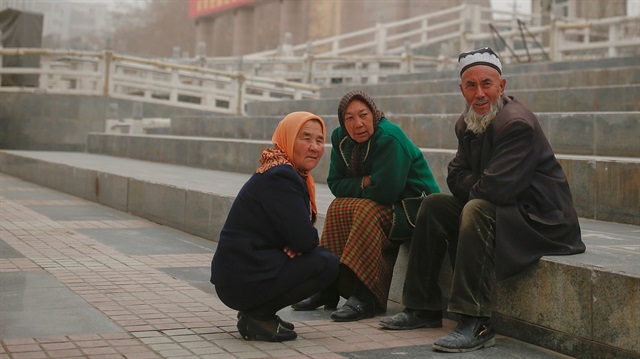
Report says up to 1 million Muslims in Xinjiang region are being held at 'political re-education' camps
China is expanding its “political re-education” camps targeting Turkic-Muslim Uighurs in Xinjiang region, according to a Wall Street Journal report.
The report, published on Friday, said China has sharply expanded an internment program that initially targeted ethnic Uighur extremists but is now confining vast numbers of the largely Muslim minority group, including the secular, old and infirm, at camps across the country’s northwest.
Xinjiang region is home to around 10 million Uighurs. The Turkic Muslim group which makes up around 45 percent of the population of Xinjiang, has long accused China’s authorities for cultural, religious and economic discrimination.
Satellite images and a specialist in photo analysis show that camps have been growing, the report said.
The report said up to one million people, or about 7 percent of the Muslim population in China’s Xinjiang region, have now been incarcerated in an expanding network of “political re-education” camps, according to U.S. officials and United Nations experts.
The full extent of the internment program was long obscured because many Uighurs feared speaking out, the report said.
It said six former inmates interviewed described how they or other detainees had been bound to chairs and deprived of adequate food.
“They would also tell us about religion, saying there is no such thing as religion, why do you believe in religion, there is no God,” said Ablikim, a 22-year-old Uighur former inmate.
The report said three dozen relatives of detainees were interviewed, five of whom reported that family members had died in camps or soon after their release. Many said they had struggled to determine where their relatives were being held and the state of their health.
A senior Chinese official, Hu Lianhe of the United Front Work Department, publicly acknowledged the existence of the camps for the first time this week but said they were “vocational training centers”, the report added.
Responding to questions from a UN panel, Hu said there is no “arbitrary detention” in Xinjiang and denied one million people were being held. He didn’t say how many people were in the centers.
The report said many experts on the region and Uighur activists say unrest there is driven by China’s heavy-handed policing, strict limits on religious activity, and preferential policies for non-Uighur migrants to the region.
China stepped up many of those restrictions in the past two years, banning men from growing beards and women from wearing veils, and introducing what many experts regard as the world’s most extensive electronic surveillance program, it added.
Other former inmates interviewed said they were instructed that they should not pray, keep a copy of the Quran or fast during Ramadan. Some said they were forced to eat pork, which is forbidden in Islam.
Hello, the comments you share on our site are a valuable resource for other users. Please respect other users and different opinions. Do not use rude, offensive, derogatory, or discriminatory language.
The floor is all yours.








